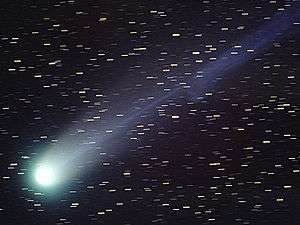12P/Pons–Brooks
| Discovery | |
|---|---|
| Discovered by |
Jean-Louis Pons William Robert Brooks |
| Discovery date | July 12, 1812 |
| Alternative designations | 1812; 1884 I; 1954 VII |
| Orbital characteristics A | |
| Epoch | 1954-Sep-15[1] |
| Aphelion | 33.468 AU |
| Perihelion | 0.77366 AU |
| Semi-major axis | 17.1212 AU |
| Eccentricity | 0.95481 |
| Orbital period | 70.85 yr |
| Inclination | 74.176° |
| Last perihelion |
May 22, 1954[2] January 25, 1884 September 15, 1812 |
| Next perihelion | April 21, 2024[2] |
12P/Pons–Brooks is a periodic comet with an orbital period of 71 years. It fits the classical definition of a Halley-type comet with (20 years < period < 200 years).[1] The comet was suggested by Carl Sagan as the spectacular comet seen by the Chinese in 1486 BCE which, according to historical researcher Graham Phillips, might have inspired the rise of a number of new religions around the world[3] It will next appear in 2024.[2]
Discovery
12P/Pons–Brooks was discovered on July 12, 1812, by Jean-Louis Pons. Independently, it was later found by Vincent Wisniewski on August 1, and Alexis Bouvard on August 2 the same year. In 1883 it was accidentally "discovered" by William Robert Brooks and later identified as the same object. Shortly after its initial discovery it was found to have an orbital period of about 70 years with an error of about 5 years. Johann Franz Encke determined a definitive orbit with a period of 70.68 years. This orbit was used to generate an ephemeris for the 1883 return, but searches were unsuccessful, until it was rediscovered by Brooks.
Orbit
With a steep orbital inclination of 74.2° this comet does not spend a lot of time near the ecliptic where it is easiest to interact with other bodies. The comet's orbit appears to be stable between 1740 and 2167, with no strong perturbations by any of the planets.[4] The Jet Propulsion Laboratory's (JPL) website shows that between the years 1900 and 2200, that the comet is only insignificantly perturbed by Saturn on July 29, 1957, when it passes within 1.6AU of the giant planet's powerful influence.[5]
References
- 1 2 "12P/Pons-Brooks". JPL Small-Body Database. Jet Propulsion Laboratory. SPK-ID: 1000068. Retrieved 2011-10-17.
- 1 2 3 12P/Pons-Brooks – Seiichi Yoshida @ aerith.net
- ↑ Graham Phillips: The End of Eden
- ↑ Kronk, Gary W. (2001–2005). "12P/Pons-Brooks". Archived from the original on 2009-05-09. Retrieved 2009-05-07. (Cometography Home Page)
- ↑ "12P/Pons-Brooks close-approach data". JPL Small-Body Database. Jet Propulsion Laboratory. SPK-ID: 1000068. Retrieved 2009-05-06.
External links
- Comet 12P/Pons-Brooks light curve (Dmitry Chestnov)
| Periodic comets (by number) | ||
|---|---|---|
| Previous 11P/Tempel-Swift-LINEAR |
12P/Pons–Brooks | Next 13P/Olbers |

